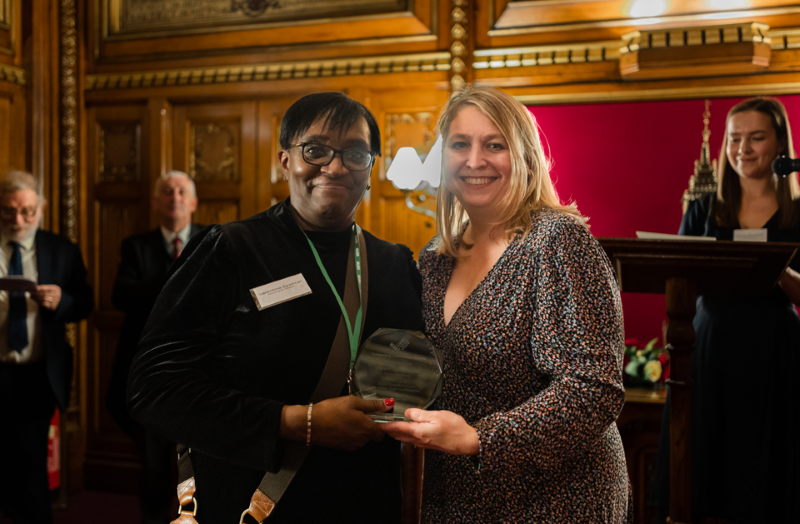Valentina Spencer scoops Anti-Slavery Day Award

Valentina Spencer has worked at Housing for Women for almost five years. Recently she became the proud recipient of the Anti-Slavery Day Award. Each year the Anti-Slavery Day Awards is held to celebrate the work done by the media to highlight important issues of human trafficking, and those who have made an outstanding contribution to the fight against modern slavery. The event is a chance to raise awareness of modern slavery, highlight good practice, and focus attention on the areas of policy and practice where improvements still need to be made.
Congratulations on your award, what does it mean to you?
I was very honoured and proud. I felt very privileged to receive such an award.
Describe your role at Housing for Women.
I am a Support Worker for SafeSpace where I focus on anti and modern slavery. We have two flats with four women, and I have been working with them for over 18 months.
Prior to that I was working for Reconnect to embed women into the community and help rebuild their lives. The aim was to help them to move into independent living. In this role I often saw women reoffend and go back into prison. I also worked on the ReUnite scheme to help women who wanted to be part of the community but also to be reunited with their children. I helped women get access to public resources and worked very closely with solicitors.
What is the favourite part of your role?
Seeing women who are very traumatised coming into the service, who then leave with confidence and feeling empowered.
What is the best thing about working for Housing for Women?
The flexibility – during my career I have had the opportunity to move around on different projects. Housing for Women has allowed me to use my skill in different areas.
How has Housing for Women hanged over the years?
I have seen quite a few changes in policies. When I started the IT was very old school; it was very slow but over the years I have watched it grow to what it is now. I have seen them implement a lot of changes. With regards to the organisation itself I have seen staff come and go but I have always seen their vision. We got through COVID. What has kept me at the organisation is the fact that they believed in me and supported me. H4W rebuild lives.
Tell us about the SafeSpace project and what it does and the difference it makes to the women’s lives.
There are two elements to SafeSpace – the flats and the drop-in centre. We have two flats which are safe and two women in each flat. Each woman is at a different stage in their asylum claim. I meet regularly with them. H4W pays the rent, we supply them with toiletries, subsidised Tesco vouchers etc. The Drop-in centre runs three days a week for women who have been trafficked. All over London aka Pan London. They can come in for support etc. The aim is to extend the service and offer more resources.
What changes would you like to see in the organisation?
I would like to see more projects and schemes. We are still small in comparisons but that is our USP
How does Housing for Women differ from other housing associations?
We have less cases to work on so you can get to know the residents well and do a much better job.